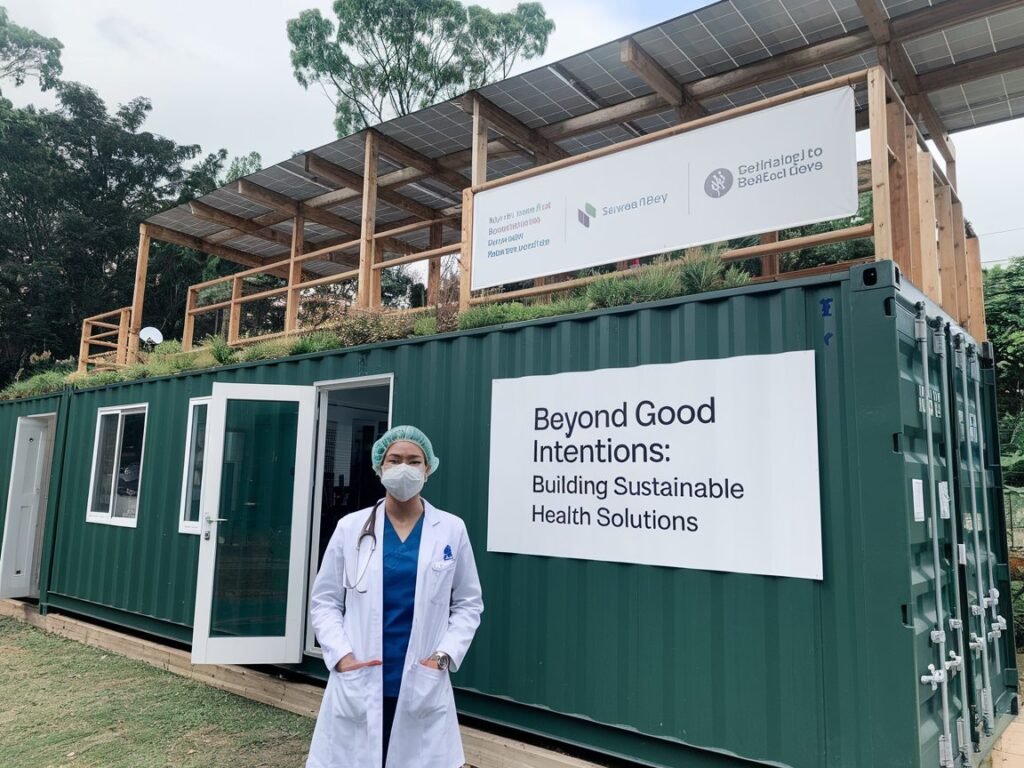It’s about addressing the power dynamic imperative in ensuring health for all.
Goodwill is not always sustained. At Unlimited Health, we recognize that how we work is as critical as what we achieve. As our journey has unfolded from a nonprofit organization to an academic research group into a catalyst for long-term health systems that assure health equity, a paradigm shift has occurred in how neglected tropical diseases will be addressed.
Rather than create new agencies, we have always tried to develop the capacities to realize nationally owned programmes, supplementing and reinforcing those that already exist, with the resources needed to do so. In practical terms, it means we do not have our own presence in the countries where we assist; rather, we work directly with our MoH colleagues, providing support as needed and at their direction. However, to truly transform and address the remaining barriers to health for all, we have been continuously refining how we operate. We introduced a new strategy and brand last year on account of all the above-mentioned and previously blogged-about reasons.
This strategy, our new identity, and our brand aim to contribute to increased health equity through the elimination of avoidable parasite infections and supporting robust systems that maintain good health to assure full potentials are met. Most importantly, putting on our new brand meant the conscious decision to focus on and commit to how we do our work with equal emphasis to what we are doing. Our role in supporting locally-led development and health equity
Power imbalances between foreign stakeholders and local health systems have hindered global health efforts for decades through the wasting of resources, fragmentation, and the undermining of long-term viability for health interventions and programs. Read More
The development of competing health care delivery networks has weakened the very national health systems that international funding for vertical health programs was supposed to strengthen. Local ownership of health system priorities is well recognized to create the conditions needed to generate lasting impact for health programs. By being even more responsive to the needs of our colleagues in endemic countries, we believe that we as an organization and members of the broader NTD community are bound by a duty to advance the larger agenda of health equity and health systems resilience. At the end of it all, it is the responsibility of each Ministry of Health to care for the well-being of its people and actualize activities within their umbrella.
It is with such a backdrop of global health and dynamic development that our approach has also been matched to the three pillars of the World Health: We anchor our approach in country ownership, partnership, and alignment with country needs, as described in the WHO’s NTD road map. This involves advocating for realistic country strategies aimed at domestic resources and health systems that act to carry out programmes in response to needs in the population. It means much of what is currently done through international development processes needs to be “undone,” and we understand that this will take time before obvious impact becomes apparent. Committing to the principles of coordination, cooperation, and partnership
Based on the latest global progress report on NTDs issued by WHO last month, 89.1 million schistosomiasis patients were treated in 2022. We contributed to the facilitation of treatment for 40% of all patients treated against schistosomiasis in the world through collaboration with our MoH counterparts. This underlines the impact and importance of such partnerships.
It is not only our organization that we are changing.
We are particularly proud of our membership in various partnerships, which include the following: the Paediatric Praziquantel Consortium is a public-private partnership that aims at facilitating supply and access to a new pediatric formulation for schistosomiasis. How Does Life insurance Operate
Thanks to this consortium, this new treatment is one step closer to making a real difference in the lives of adolescents in need after it succeeded in being added to the WHO list of prequalified medicines. However, we would not stop at treatment. We support and hope that the trend away from vertical disease programs and toward more holistic strategies that bring together NTD initiatives with other medical services continues. Just imagine, in some future setting, a woman coming in for cervical cancer screening being diagnosed and treated for FGS in the same sitting.
That is the type of coordinated, efficient care that the FGS Integration Group and other coalition members aim to achieve. From Disease Control to Elimination Apart from a greater emphasis on better coordination among different sectors, such as WASH, education, and nutrition, the adoption of One Health for dealing with root causes of the infection cycle itself, WHO’s recommendation for a switch from vertical disease programs to holistic and impact-oriented approaches toward elimination means focusing on these very areas. For efforts toward the eradication of diseases to benefit future generations, these many sectors must continue to provide interventions that go beyond treatment to include prevention and, where indicated, care for symptoms of disease. Efficiency and less workload on the healthcare profession demand the need to be determined on how disease-specific interventions can be integrated with other disease control programs and other health services within the healthcare system. Home Page
Laying the foundations to achieve the end goals
Above and beyond emphasizing the importance of giving these diseases top priority, Sustainable Development Goal 3 and the WHO NTD roadmap make it clear that endemic countries must continue to be in the lead and assume responsibility for bringing about an end to NTDs.
This will include securing the commitment of new funders, as well as supporting our national partners to mobilize their own domestic resources, in better targeting NTDs.
Better use of domestic resources can also be utilized to assist in the eradication of diseases and reliance on external resources that are more irregular.
Although it requires a different way of thinking, it is necessary to achieve the transformation we all want to see and to make health sustainable. Altering how global organizations, regional health systems, and communities burdened by parasitic disease relate with one another is more crucial for transforming global health than making additional funds or medications available. At Unlimited Health, we are dedicated to contributing our share toward this transformation. And this is starting to pay off. By putting genuine partnership and country ownership first, we’re building a world where the parasitic diseases have been consigned to history, strong health systems are in good health and, quite rightly, equitable. Check back for our next post in the series, Reimagining global health, as we go to hear from our partners on how we meet these commitments. Embracing change, empowering communities: Unlimited Health’s journey to universal health. Product Containing CBD
Our operating environment is evolving at an unprecedented pace, and over the next two decades, this rate of change is likely to quadruple.
Over the last five years, priorities in development aid and overseas assistance have changed with geopolitical events, the longer-term consequences of the COVID-19 pandemic, 25% of the world’s population living in countries affected by conflict, and adverse impacts from climate change exacerbating resource scarcity, food insecurity, fuel displacement, and humanitarian crises, particularly in vulnerable areas, further burdening already fragile health systems.
These events have sharpened health inequities and forced us into an introspective process of our position and purpose amidst this rapidly changing world.
What a change in landscape means for ending parasitic disease
According to the most recent Action for Global Health Stocktake Review, COVID-19, climate change, and conflict have been a significant negative influence on the world’s progress toward SDG 3, which guarantees healthy lives and promotes well-being at all ages. While it was expected that access to essential health services such as maternity, neonatal, and child health would see a dramatic increase in line with improvements made before 2015, access has been slow. According to the Tracking Universal Health Coverage: 2023 Global Monitoring Report, nearly half of the global population had no access to basic medical care in 2021. Growing inequalities and other structural barriers, including lack of access to clean water and improved sanitation facilities, have constrained the ability of people to evade NTDs and thus further limited their access to other services and health care. Changes in climate affect the spread and transmission of disease burdens.
Changes in temperature and precipitation have thus allowed endemic transmission in Europe and the USA for dengue, leishmaniasis, and schistosomiasis.
More climate change can thus affect other susceptible groups of people, and it can make them more susceptible to parasitic diseases and less resilient to a host of new risks that could threaten their health, their ways of life, and access to healthcare.
The change in the UK’s political tide over the decade saw its ODA take a different turn, with increased proportions of it being spent domestically, just like other high-income donor countries such as the US and Germany have set trends. For the first time since 2013, it was cut in 2021 from 0.7% of gross national income to 0.5%. Added to these, the decrease in interest and financing for multilateral mechanisms of international cooperation are what hold world progress back from being able to tackle complicated problems on a global scale. It is the most impoverished and vulnerable individuals in developing low- and middle-income countries, of whom many reside in countries endemic to parasitic infections. A crossroad with an opportunity for positive outcomes
The financial and sociopolitical environment is dire.
With only 15% of the indicators expected to be met halfway into the SDGs, it is an opportunity that our organization must seek-also to arise from these difficulties. It’s now high time for us to go back to the drawing board and re-think the architecture of global health financing and functioning of international institutions like ours against the backdrop of the contracting financial space in which global health initiatives are being prosecuted. The need to shift the power dynamic currently at play, threatening both locally led development and health system resilience, is increasingly recognized and fuels momentum for change in funding architecture. disparities. It calls for a shift of the agenda from the funders to local ownership, then to
sustainability, and respectful partnership. That requires encouraging collaboration across sectors to allow health systems to provide quality medical care to anyone in need. Along with the SDGs, the World Health Organisation published its NTD road map for 2030 in 2021, outlining global targets and indicators for the control, elimination, and eradication of these diseases.
We resolved to align the road map pillars with our work and organizational strategy for 2023–2028 so that we may be appropriately positioned to respond to the challenge brought about by shifting external circumstances.
Along with this shift in strategy came a new identity for the organization, targeted around the goal of eliminating preventable parasitic diseases and reflecting input from our ministry of health partners. But we did more than change our name; we want to do things differently, too. Time for a temperature check At the Foreign, Commonwealth and Development Office, we recently published a white paper refreshing the UK’s international development agenda and highlighting the need for action
beyond traditional aid if the scale of the challenges we are facing is to be met.
2024 has been termed a “super election year” because 50% of the world’s population will vote.
That may mean big changes around the world, and how countries cooperate and coordinate on the global stage. The WHO has also just released its global report on NTDs, featuring quantitative data with regard to the trajectory of the road map for 2030 targets. We also believe in keeping ourselves accountable, hence the reason we launched our new brand and plan for 2023–28 a year ago today. It’s therefore time to take the temperature. Sleep Mudras can this old old age yogic
In the next installment of this series, we will be discussing how, from one year ago, our context has changed.
We also detail in full how we adapt to this new reality and how we strengthen evidence, partnerships, and approaches toward sustainable development. For More Information visit the site



